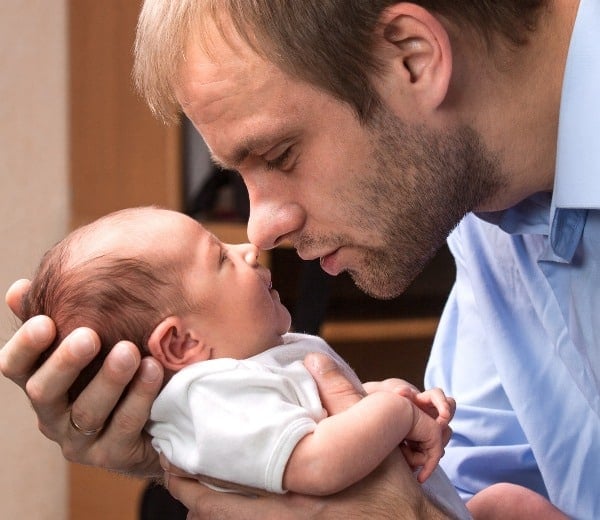As part of our efforts to raise awareness for mothers and mental health, we have created this postpartum depression quiz.
For a new mother and father, having a baby is a joyous occasion that brings a lot of emotions that include joy, bliss, and awe. These are all positive emotions for new parents, but for mothers the experience of childbirth may include the emotions of feeling sad. This is known as the baby blues. The baby blues are attributed to the hormonal changes in a woman’s body after giving birth. This is normal and typically lasts for two weeks after childbirth.

As a new father, like me, you may be surprised that the baby blues are part of a women’s experience in recovering from giving birth. As I learned about this, I realized how important it is to be helpful as much as possible to help my wife get through the baby blue stage.

But, what if the baby blues don’t go away after two weeks? If the baby blues haven’t subsided after two weeks or so, then as a father and a husband you should start looking for signs of postpartum depression. I recommend taking the postpartum depression quiz at the end of this post.
What Is Postpartum Depression?
One out seven women will experience postpartum depression. Postpartum depression is not the baby blues amplified, but is clinical depression associated with childbirth. Postpartum depression, for a woman, is not only having feelings related to the baby blues, but also having feelings of sadness, anxiousness, and worry. Feeling this way can last several weeks or longer which can severally affect a new mother’s ability to get through the day.
New mothers may not recognize this as postpartum depression, so it is important that a father know how to help a new mother postpartum by looking for the signs and symptoms of postpartum depression and by taking the postpartum depression quiz. The following are symptoms of postpartum depression:
- Sadness, loss of hope, despair.
- Feeling unable to care for the baby or do basic chores.
- Crying a lot, sometimes for no real reason.
- Trouble feeling close to the baby.
- Less interest in food, sex, self-care, and other things she used to enjoy.
- Too much sleep.
- Trouble with focus, learning, or memory.
Along with seeing these symptoms in your wife it may be helpful for you (the father/husband) to take this quiz to help you determine if your wife has postpartum depression. If possible, ask your wife if she would be willing to take the postpartum depression quiz. If the majority of your answers or her answers are A or B then you should strongly encourage your wife to see a health professional who can properly diagnose your wife as having postpartum depression and then begin receiving treatment.
Postpartum Depression Quiz
1. Does your wife cry for no particular reason?
- Yes, often
- Sometimes
- Rarely
- Never
2. Does your wife have trouble sleeping or eating?
- Yes, a lot of trouble
- Some trouble
- Only slight trouble
- No trouble at all
3. Has your wife ever suffered from a psychiatric illness? (Women who answer yes to this are more susceptible to postpartum depression)
- Yes
- No
4. Has your wife lost interest in her hobbies?
- Yes, she’s not showing any interest in her hobbies anymore
- She doesn’t seem to be having as much fun with her hobbies
- She’s having just as much fun with her hobbies as before
- She hasn’t had time to do any of her hobbies
5. Does your wife seem to suffer from feelings of helplessness?
- Yes, often
- Sometimes
- Rarely
- Never
6. Has your wife recently suffered from unusual stressful situations, such as family illness or lost a loved one? (Women who answer yes to this are more susceptible to postpartum depression)
- Yes
- No
7. Does your wife struggle with completing normal household tasks?
- Yes, a lot of trouble
- Some trouble
- Hardly any trouble
- No trouble at all
8. Does your wife seem to doubt her ability to care for the baby?
- Yes, all the time
- Frequently
- From time to time
- Not at all
9. Does your wife seem to struggle remembering things?
- Yes, a great deal of trouble
- Some trouble
- It comes and goes
- No trouble at all
10. Has your wife suffered from anxiety or panic attacks?
- Yes, frequently
- On occasion
- Only a few
- Not at all
11. Has your wife ever had thoughts of self-harm?
- Yes, numerous times
- Only once or twice
- No, not that I know of
12. Has your wife ever seemed overly nervous?
- Yes, very nervous
- More nervous than usual
- Her nervousness comes and goes
- No more nervous than before
13. Does your wife seem less interested in sex?
- Yes, very much so
- It comes and goes
- Only slightly
- Not at all
14. Has your wife had difficulty concentrating and making decisions?
- Yes, a great deal of difficulty
- Some difficulty
- Hardly any difficulty
- No difficulty at all
15. Is your wife suffering from headaches or stomach pains?
- Yes, all the time
- On and off
- It’s only happened a few times
- No
Other articles you might enjoy:
- How to Survive the First Days and Weeks with a Newborn
- Tips for Newborn Photo Shoots
- Quick and Easy Freezer Meals
Pin this Postpartum Depression Quiz to Reference Later:

The image featured at the top of this post is ©iStock.com/VKarlov
